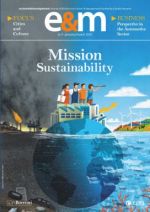Search
Refine search
- Keyword
- Sustainability (37)
- Business (27)
- sustainability (22)
- Italy (20)
- ESG (19)
- innovation (18)
- tipocontenuto_006 (17)
- China (16)
- Subject
- Accounting & control (234)
- Economics (164)
- Financial system (40)
- Management (28)
- ICT (26)
- Environment & Energy (20)
- Society & Culture (20)
- Law (18)
- Sector
- Services industry (10)
- Media & communications (3)
- Heritage (2)
- Manufacturing (2)
- Non-profit sector (1)
- Primary industry (1)
- Education, training and research (1)
- Transport (1)
- Content type
- Journal article (398)
- Editorial & column (38)
- Infographic (12)
- Case history (4)
- Book (4)
- News & intervention (4)
- Dossier and report (3)
- Interview (2)
- Language
- English (267)
- Continent
- Europe (23)
- Asia (3)
- Africa (1)

New Rules for the Infrastructure of the Gigabit Society
Telecommunications infrastructure has become essential for any social and economic activity. The potential of digital technologies such as IoT, Big Data, artificial intelligence, and blockchain will revolutionize the operating models of private enterprises and public administrations, with a strong and pervasive social impact.#In this regard, both in Europe and in Italy in particular, there is a need ...

The Digital Future of the Italian System
With the Connecting Europe Facility (CEF) strategy for the single digital market, the European Union has set ambitious goals for a Gigabit society by 2025, allocating a budget of 3 billion euros and a unitary European focus on infrastructure linked to connectivity.#Italy is closing the gap it had in the supply of infrastructure and for the coverage of fast broadband, but must take significant steps ...

Digitalizing is a Must
The widespread extension of connectivity, along with a growing quantity of information generated by smart objects, opens completely new scenarios. The world of industry, for example, can face projects of transformation towards "smart factories," with greater efficiency, flexible and personalized production, planning of phases of work, and a resulting increase in competitiveness. To include the largest ...

Networks at the Center of the Urban Ecosystem
In the last 10 years, the service that energy and gas distribution network must guarantee has changed radically: points of production linked with a medium and low voltage network, increasing electrification, and much more volatile gas consumption.#Refocusing on networks will lead to an additional effort in the coming years to make new technological solutions operational: more flexibility, more safety, ...

An Intermodal Future for Milan-Bergamo Airport
In 2018 alone, the Italian airport system saw an increase of passenger traffic of more than 5.9 percent compared to the previous year, with over 185 million people carried and 1.6 million airplane movements. In this context of growth, the Milan-Bergamo airport is in third place in Italy, with a forecast of 13.5 million passengers in 2019, representing one of the main gateways of access for eastern ...

Electric Infrastructure for tomorrow
Electricity networks require urgent technological evolution, to allow for an energy transition towards a more sustainable model of production. The scenario presented in the Energy and Climate Plan (PNIEC) sent by the Italian government to the European Commission implies a strong commitment in regard to networks. Our daily life, which is increasingly digital, requires highly technological networks, ...

The Challenge of Complexity
CEOs are increasingly important figures of reference in our society. In today’s increasingly complex political and economic context, their role is not so much to reduce that complexity, but to manage it and explore the possibilities of what does not yet exist. In this scenario, CEOs are thus asked to express a new way of thinking, a new mindset.

Decarbonization and the Challenges of Big Oil
The reduction of the use of fossil fuels in the economy represents an existential challenge for oil companies, on which pressure is increasing from governments, institutional investors, and civil society, as they are considered among those most responsible for greenhouse gas emissions, and thus climate change. Currently, each “Big Oil” company is facing four possible strategic options: decide ...

Why and How to Be a B Corp or Benefit Corporation
The purpose of a business consists of setting a concrete goal that has a social, ethical, or cultural meaning for society in general, that goes beyond financial performance. B Corporations and Benefit Companies are businesses that attempt to combine financial success with the protection of the environment or all of their stakeholders. Born in the United States, these companies are also spreading widely ...

The 2030 Agenda: An Appointment that Regards Us All
The 2030 Agenda represents a great opportunity for transformation starting from the principle of "sustainable development." It is the occasion to review the economic model we have used over the last 40 years and move on to a more advanced form of capitalism, that respects both the environment and social and intergenerational justice. Redefining the value chains of all production sectors in sustainable ...